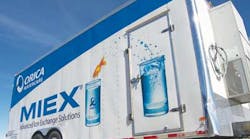By PHIL SUTIN
Oct. 15, 2000 (St. Louis Post-Dispatch)—Voters throughout St. Louis County on Nov. 7 will consider establishing a waterline insurance repair program with a fee of $12 a year.
Unlike a similar sewer lateral insurance program, the water program would cover the entire county, not just municipalities whose voters adopt it. The water program would cost property owners less than half the cost of the sewer program.
Under the program, homeowners must prove to county officials that the waterline between their houses and a water main leaks. Plumbers selected by the county would replace a line or make a repair, refill the trench dug to get at the line and put grass seed on top of the bare ground.
County officials hope to put a $3 fee on quarterly water bills of the St. Louis County Water Co. They have reached a tentative agreement with the company for that arrangement but have not worked out the details. Otherwise, the county could collect the yearly $12 fee with property taxes. The county has not made arrangements to collect the fee in places, such as Kirkwood and Webster Groves, where municipalities provide the water service.
Some of the money raised by the fee also would pay for relocating residential waterlines that must move because of highway widenings.
Opponents of the proposal say repairing leaking waterlines should remain the responsibility of property owners.
Garry Earls, director of public works for St. Louis County, said about 2,000 repairs of residential waterlines occur each year in the county. A typical job costs about $1,600, he said. But if workers must dig up a street or move an obstacle, such as a patio, homeowners could pay as much as $15,000, he said.
A leaking waterline can pose a health hazard as well as be a blow to homeowners' expenses. Contaminants can flow backward into the water line, he said. The water company, he said, has authority to shut off water to properties whose owners don't fix leaks. Because meters are in houses after water travels through lines, the water company is not paid for water that leaks from the lines.
Leaking waterlines could undermine streets or alleys leading to cave-ins.
"Leaks waste a precious resource — purified drinking water," Earls said.
St. Louis has operated a limited waterline repair program since the late 1980s and a sewer lateral repair one that started a few years earlier.
Municipalities and St. Louis County for the unincorporated area operate voter-approved sewer lateral programs. They cover most homeowners in St. Louis County but not all of them.
Earls said differences in water and sewer laterals are the main reason for a countywide approach on water lines and a local one on sewer laterals. Officials are not discouraged by the patchwork of lateral insurance coverage, said Earls and state Sen. Wayne Goode, D- Pasadena Hills, a sponsor of the state law authorizing the waterline program.
Laterals are much larger than waterlines — six inches versus one inch. Basement backups can occur for several reasons, not just broken laterals, he said. Clogged debris that a power auger at the end of a cable can break is another major factor, he said.
A sewer lateral repair could cost $4,000 or more, Earls said. Workers have to dig a larger trench for sewer laterals because they are bigger and buried deeper than waterlines, he said. The lateral insurance fee is $28, payable once a year with homeowners property tax bills.
Goode said the water company wants to treat all customers the same.
The water company successfully resisted efforts by some state legislators in the 1970s and 1980s to make it responsible for water lines to houses. The insurance program is a compromise, Goode said.
St. Louis County Councilman Greg Quinn, R-Ballwin, opposes the waterline insurance program.
"Everyone in St. Louis County will pay for a program very few people will use," he said. "I see no good reason why it should be the subject of a government program."
Leaking roofs can cost more to repair than broken waterlines and can become a hazard, Quinn said. Yet fixing them remains the property owner's responsibility, he said.
© 2000 St. Louis Post-Dispatch via Bell&Howell Information and Learning Company; All Rights Reserved.

